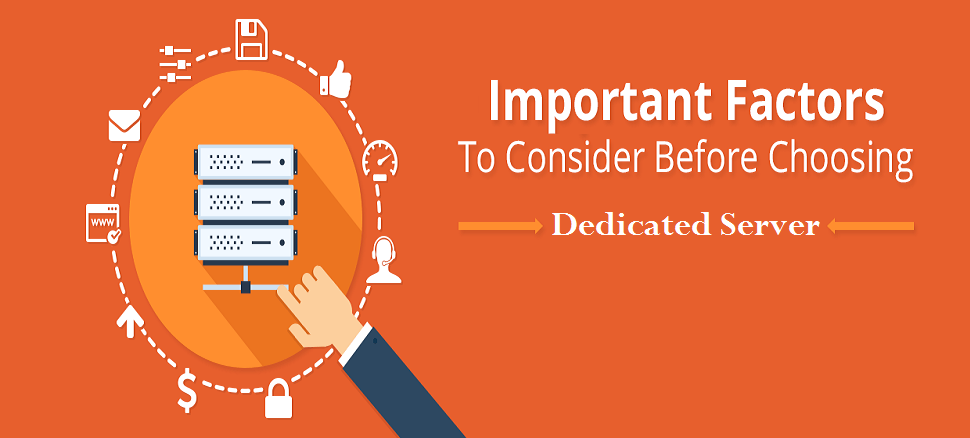Table of Content
It is very important to analyze your hosting needs before jumping to decisions. There is hardly any sense in repeated switching of servers because the process is not only complex but is also highly time consuming and expensive.
There are few vital parameters such as type of workload, deliverable’s, and need for large databases to be considered before understanding the type of server required for your venture.
Following are the eight significant factors related to dedicated servers one needs to understand before finalizing its hardware configuration and a service provider.

Ability to Absorb Downtime
Since there is usually a single point of failure in dedicated server, on must be prepared for a possible downtime due to failure of hosting environment. The only other choice would be to scale up to several dedicated servers.
Users of dedicated server must have proven expertise in dealing with an eventuality of hardware failure. Unlike cloud hosting which has a unique set-up for securing users against server crash, users of dedicated servers should know the level of acceptance of downtime.
Understanding Scalability of Application
One should have an in-depth knowledge about scalability of the application that is going to run on the dedicated server. The application needs to be studied in terms its ability to run on multiple servers and the impact of the same on growth in number of visitors.
Ease of scalability provides freedom from choosing a specific type of server to run a particular application. However if your application cannot be scaled on more than one server, then you will have to synchronize the application over all database servers.
This can be an overwhelming task. Databases can be easily moved to server with greater storage, RAM, and processing capacity. In contrast, cloud environment facilitates cloning of the server while having a copy running in production and redirecting traffic to several servers by adding a load balancer.
Defining Performance Needs of your Sever
Performance requirements must be understood critically by knowing the expected number of users and requirement of number of servers. It should be noted that presence of multiple hardware choices can significantly influence performance of server.
Choosing CPU/Processor – You are allowed to decide number of cores and processors in a given server. This can be influenced by the type of application and whether adding more core would boost performance or not. Ideally a multi-threaded application does benefit from multiple cores including database servers or web servers.
It is also advisable to take into account performance of core in terms of clock speed in MHZ because even with less cores and greater GHz per core, some cores deliver a superior turnaround time.
In addition to considering expected number of users, you should take advice regarding number of cores and type of processor from software vendor or anyone who happens to manage the application.
Random Access Memory (RAM)- Your RAM options are multiplied if you have a faster CPU and more cores. In case you are not sure about your RAM requirements then it would be easy to select a server that enables addition of RAM if required. You can choose from vast spectrum of RAM choices particularly with double processors.
You should consider the server size while selecting RAM as per the latest technology of DDR4 that facilitates an enhanced database performance. Being a current standard, the price of DDR4 is well within the reach.
Setup for Hard Drives- In order to immunize your website against single hard drive failure, you need to select a RAID setup. Even in case of a single hard drive failure, you can have your site up and running by the time you replace hard drive, notwithstanding a minor loss of performance.
Your hard drive options can multiply in proportion to the size of your server. You can choose SAS over SATA for twice the amount of performance if you are prepared to pay higher price and accept its lower capacity. However, SSDs are currently in vogue due to their amazing performance that is fifty to hundred times greater than SATA.
Handling Spikes with Load Balancers
If you are running an application that is capable of scaling across several servers, then using a form of load balancers to serve huge number of users that are divided in multiple servers is the most sought after solution. This type of situation is bound to arise as your traffic keeps on rising. Load balancer facilitates directing every request to a particular request to balance the traffic by minimizing chances of excess load on a single server.
Predicting Bandwidth Consumption
It is easy to define required bandwidth if the traffic is predictable. Choosing a package that offers unmetered billing option or large amount of data traffic to control your spend.
Server Location and Network Quality
Speed of data delivery is directly influenced by the distance between your users and server. Hence you need to choose a host with servers positioned in Europe, if your users are located in Europe. Second factor to consider for faster delivery is the quality of network by testing the network and by checking Network Operation Center page of the provider.
Server Management
As a user you need to know the extent of your authority in terms of server management. In order to manage your server you should be provided with facility of remote management with help of remote management module.
Knowledge Sharing
It is of utmost importance that your host engages his technical experts during designing a customized hosting solution. You should be advised by the web host about best practices and availability of a multitude of solutions with recommendation of hybrid solutions that merge different products into one solution.






 Live Chat
Live Chat